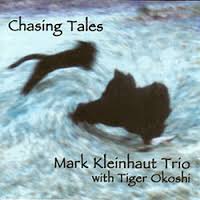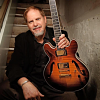Home » Jazz Musicians » Mark Kleinhaut
Mark Kleinhaut
Jazz guitarist /composer Mark Kleinhaut has been playing guitar since he was nine-years-old; when he converted his sister’s folk guitar into an electric guitar by screwing a radio shack clip microphone to its top and plugging it into the home stereo. By age 12 he was playing one chord jams with his friends. Mark’s interest in jazz developed gradually; as a kid hacking around on the guitar, he was really into Yes, Genesis, ELP and Jethro Tull, and when he heard groups like the Mahavishnu Orchestra, Return to Forever and Weather Report, it changed everything. For Mark, the virtuosity, extended compositions and interaction of these musicians was overwhelming–pure magic. He completely immersed himself in this music, and when he learned that all those musician magicians had a common link- Miles Davis, he worked backwards from Miles’ electric groups to Trane and Bird, and from there his listening and interests branched to everyone and everything jazz.
Mark attended Rutgers University as a pre-med student, that is, until he first heard guitarist Ted Dunbar. Dunbar was conducting his class on the lawn near where Kleinhaut could overhear. He was teaching his theory on tonal convergence and Kleinhaut was mesmerized. “I wanted to be able to do what he was doing,” Kleinhaut said, “Soon I was bringing my guitar and haunting his classes soaking up everything he was saying, and going back to my dorm room and practicing for hours on end. I guess my stalking him finally got his attention, because he turned to his class one day, pointed at me and said, ‘see this guy, this guy is hungry, why aren’t you taking this class?.’ Kleinhaut considers Ted Dunbar his first real teacher, “He showed me how the guitar was unique among all musical instruments, like a slide rule that could map out the melodies laid atop harmonic structures with horizontal and vertical axis. Dunbar stressed that it wasn’t about the notes; rather it was the touch upon the instrument that would make the guitar speak. He took the time and care to demonstrate things like swing, tension and release and telling a story with the music.” Kleinhaut recalled, “Most importantly, he guided me to teach myself, to understand that the universe of musical knowledge and experience is endless, and to always want to learn. Much of what he gave me I didn’t really understand, but it’s still lodged in my head and somehow every day a little bit more of it emerges.” After encountering Ted Dunbar Kleinhaut realized that music was going to be more than a hobby, so he changed his major to music. He graduated from Rutgers in 1979, after a full immersion in the Jazz program at Rutgers whose faculty consisted of: Ted Dunbar, Kenny Barron, Frank Foster, Paul Jeffrey and Larry Riddley, plus master classes conducted by: Barry Harris, Dexter Gordon, Jimmy Ponder, Buster Williams, Ron Carter, Billy Cobhan, Jimmy Heath and others.
Read moreTags
Mark Kleinhaut, Nat Janoff, Guillermo Bazzola, and Shan Arsenault
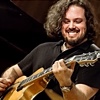
by Dom Minasi
Welcome back to Guitarists Rendezvous, our second installment in a series that introduces readers to emerging or established guitarists who fly just under the radar of public recognition. Each will field the same four questions and we've included audio and video so you can sample their music. This installment includes a diverse group of musicians from New York, New Jersey, Spain, and Canada. Meet Mark Kleinhaut Mark was born in the Bronx, New ...
Continue ReadingString Theory 2013: Mark Kleinhaut & Hristo Vitchev

by C. Michael Bailey
Six strings or seven...twelve frets give or take a couple. That is what the guitar is. Mark Kleinhaut and Hristo Vitchev are two guitarists whose vision expands the role of the guitar in both composition and improvisation. They explore, Kleinhaut with immediate improvisation and Vitchev with directed performance, the length and breadth of guitar playing with no regard to genre or the passage of time. Mark Kleinhaut & Neil Lamb Jones Street Invisible ...
Continue ReadingThe Mark Kleinhaut Trio: Holding the Center
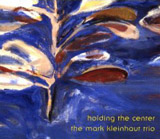
by Jerry D'Souza
Mark Kleinhaut is back with longtime bandmates Jim Lyden (bass) and Les Harris, Jr. (drums), extending the parameters with excursions into electronica, rock and Latin music. The results on Holding the Center are emphatically convincing.
Kleinhaut has a full-bodied, well-rounded tone. His guitar is an eloquent messenger, filled with melody, bounce, swing and looping patterns that are fed through a Boss looper and GT-6 processor. He uses them on “Holding the Center. The initial impact, however, comes from the bowed ...
Continue ReadingMark Kleinhaut Trio: Holding the Center

by Dan McClenaghan
It was time for this to happen. Guitarist Mark Kleinhaut has put out five CDs of original material, but his last two efforts, both on Invisible Music--A Balance of Light (2003) and Chasing Tales (2001)--showcased guest artists in front of the trio: alto saxophonist Bobby Watson and trumpeter Tiger Okoshi, respectively. Both were fine outings, but they focused on the hornmen. With Holding the Center, we've got the Mark Kleihnhaut Trio in the limelight.From apparent influences of Wes ...
Continue ReadingMark Kleinhaut Trio: Holding the Center

by C. Michael Bailey
Maine guitarist Mark Kleinhaut expands his impressive discography with Holding the Center, a progressive, contemporary outing. On his previous two recordings, A Balance of Light and Chasing Tales, Kleinhaut employed trumpeter Tiger Okoshi and alto saxophonist Bobby Watson, respectively. Here the guitarist displays his own considerable talent in the more intimate trio format.
Kleinhaut employs a guitar style best described as unhurried swing on the thirteen original compositions on Holding the Center. His tone is warm, round, and ...
Continue ReadingMark Kleinhaut Trio with Bobby Watson: A Balance of Light
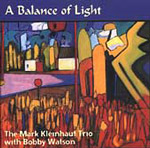
by C. Michael Bailey
Mark Kleinhaut's previous trio recording, Chasing Tales (Invisible Music, 2002), employed trumpeter Tiger Okoshi to great effect. The guitarist follows it up with alto saxophonist Bobby Watson on A Balance of Light. Kleinhaut's taut trio serves as a perfect foil to the sleek Watson as the group navigates eight of Kleinhaut's original compositions.
The disc opens with the Spanish-tinged “Ferdinand and Isabelle, providing a perfect vehicle for Watson's Latin inclinations. The style may best be termed upbeat neo-bop. ...
Continue ReadingMark Kleinhaut Trio with Bobby Watson: A Balance of Light

by Jerry D'Souza
One of the most eloquent voices on the alto sax returns, and it is no small measure that Mark Kleinhaut was responsible for bringing Bobby Watson back on record. Kleinhaut wanted to write songs particularly for Watson, and again to his credit, he realized that any music would be the starting point for their dialogue. How right he was! Watson slips right in and, in consonance with the others, turns in a stimulating outing.
It matters little what ...
Continue ReadingFarewell Performance of the Mark Kleinhaut Trio

Source:
Bennett Alliance
The Mark Kleinhaut Trio Performs at The Press Room November 12, 2006 Farewell performance before Mark Kleinhaut Relocates to Cleveland, Ohio Event Date: Sunday, November 12, 2006 Place: Press Room, 77 Daniel Street, Portsmouth NH Time: 6:00 - 9:00 PM Info: 603-431-5186 “Jazz guitar aficionados should get to know about this closely-knit, swinging unit from the pine tree state led by one of the truly brilliant guitarists on the jazz scene today." --Bill Milkowski ...
read more
Guitarist/Composer Mark Kleinhaut Releases "Holding the Center" on Invisible Music

Source:
All About Jazz
“Jazz guitar aficionados should get to know about this closely-knit, swinging unit from the Pine Tree State led by one of the truly brilliant guitarists on the jazz scene today"--Bill Milkowski
Holding the Center (Invisible Music, May 16, 2006) is the Mark Kleinhaut Trio's eclectic follow-up to their 2003 release A Balance of Light (JazzWeek Top 20, Feb. 2004), which featured world-renowned saxophonist Bobby Watson. This latest offering from master guitarist Mark Kleinhaut features his dazzling technical skills, while thirteen ...
read more
Bobby Watson and the Mark Kleinhaut Trio (4 shows)

Source:
All About Jazz
Invisible Music For Immediate Release Contact: 207-721-0958 The Mark Kleinhaut Trio and Bobby Watson Cd Release Concerts for A Balance of Light Only 4 New England Performances Date: Friday, November 7, 2003 CD release concert with Bobby Watson (sax) Mark Kleinhaut (gtr) Jim Lyden (b) Les Harris, Jr. (d) Location: Saco River Grange Hall, Salmon Falls Road, Bar Mills, ME Time: 7:30 PM Admission: $10, Seniors and students $8. Call for info and reservations: 207-929-6472 Date: Saturday, November 8 MJA ...
read more
Guitarist/Composer Mark Kleinhaut Releases New CD, Chasing Tales

Source:
All About Jazz
New release from Invisible Music also features internationally renowned trumpeter Tiger Okoshi
Chasing Tales is the third release in three years by guitarist Mark Kleinhaut. In addition to his frequent collaborators, bassist Jim Lyden and drummer Mark Macksoud, Kleinhaut has augmented his ensemble with legendary trumpeter, Tiger Okoshi. Mr. Okoshi, who has toured the world and recorded with vibist Gary Burton, Roy Haynes, Steve Swallow and Bob Moses, and his group, Tiger's Baku, now brings his world-class touch to Chasing ...
read more

